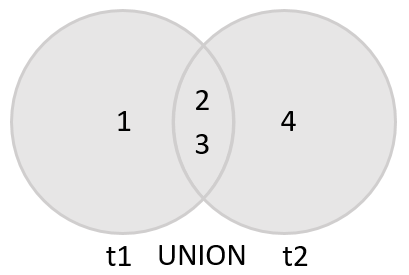As you will see the final ets will differ, but there is some interesting info on how SQL Server actually completes the process. I have explained about Minus and intersect operator in other article. First we need to know about what exactly the SQL Set Operators means and brief idea about set operators.
Then our next task is to understand the sql union vs union all. Ein doppelter Datensatz ist ein Datensatz, in dem alle Spalten des Ergebnisses die gleichen Inhalte haben. Suppose we want to perform the following activities on our sample tables. Union All - Optimal Performance Comparison.
In other words, union gives the resulting dataset without duplicate rows. On the other han union all gives the resulting dataset with duplicate rows. See: SQL SERVER – Difference Between Union vs. The difference between union and union all SQL. It won’t always work, but when it does everyone will be impressed with your performance tuning prowess.

Watch this week’s episode on. Our Skewed Data Let’s create a table and insert some data. I hope you enjoyed this article on the SQL Union operator. The following are rules to union data: The number of columns in all queries must be the same.
SELECT column_name(s) FROM table1. The corresponding columns must have compatible data types. In my role as a PostgreSQL consultant and trainer there are a couple of. The main difference is how duplicates are treate which I explain in this video.
I also cover the performance differences of these two keywords, and which one is recommended. When two Queries are combine there could be rows of record that are exactly the same (duplicates). In this article you will learn the basic differences between union and union all operators in SQL Server. All set operators have equal precedence.
If a SQL statement contains multiple set operators, then Oracle Database evaluates them from the left to right unless parentheses explicitly specify another order. Published by sqlandplsql To learn more about the Oracle, SQL , PL SQL , Performance Tuning, Database Modeling, Ubuntu, MySQL etc. Suggestions, comments, feedbacks and referrals are highly appreciated.

A JOIN compares columns from two tables, to create result rows composed of columns from two tables. UNION ALL - Includes duplicates. Las columnas tienen que ser del mismo tipo de datos. Solo se devuelven los valores distintos. This for performance reasons.
Elle permet de concaténer les enregistrements de plusieurs requêtes, à la seule différence que cette commande permet d’inclure tous les enregistrements, même les doublons. Learn what they are and how to use them in this guide. But the way in which they combine data and format of the result obtaine differs. Joins and Unions can be used to combine data from one or more tables.
In simple terms, joins combine data into new columns. The above query fetches all the values from both the tables. Similarly, you can use a WHERE Condition in both the queries independently.
SQL Tutorials provide the Best Tutorials about Structured Query Language( SQL ). Answer includes concept and difference between union and union all sql clause with example. So use these operators carefully in your query. Union and union all are commands used in SQL to integrate values from two tables. An evident difference between the two is that Union returns a distinct set of values, whereas Union all returns all the concerned values, even if they’re duplicates. VS independent of union all.
Let apply these two commands on two tables tableand table2.
Keine Kommentare:
Kommentar veröffentlichen
Hinweis: Nur ein Mitglied dieses Blogs kann Kommentare posten.